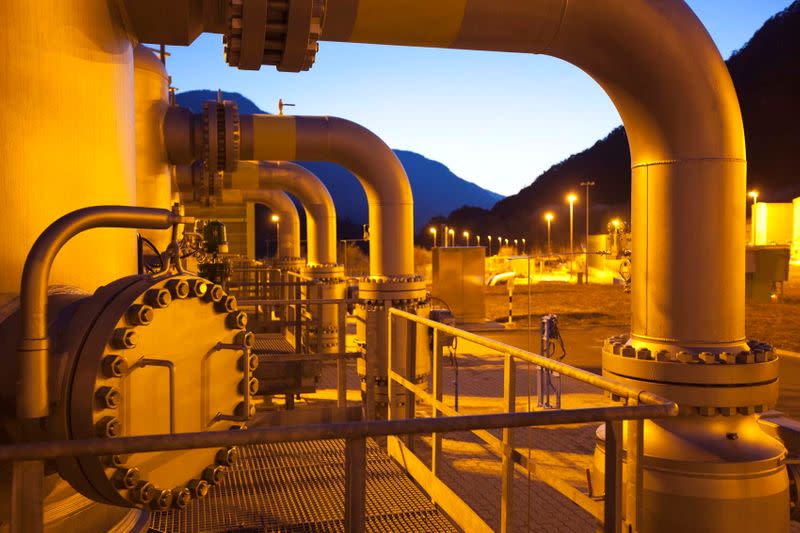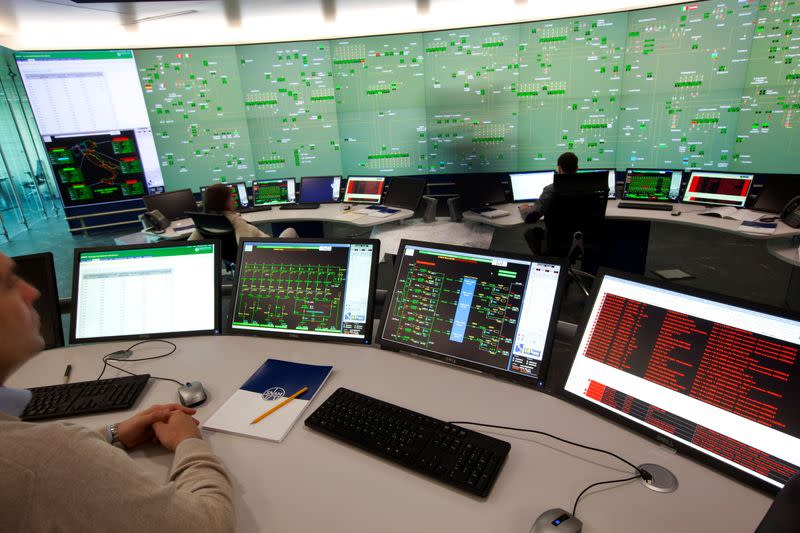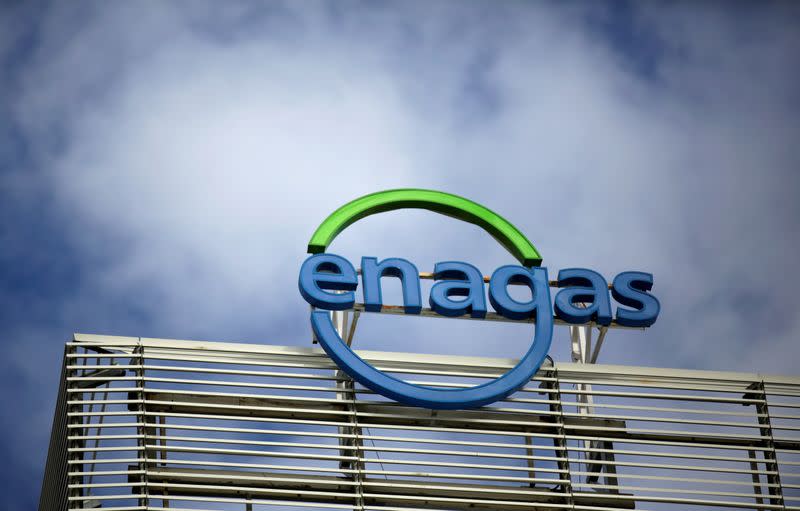(Reuters) - As world leaders hammered out a deal last week to slow climate change, gas engineer Michele Ricciardi was digging into a practical problem: How thousands of miles of pipelines across Italy and Europe can safely carry hydrogen.
The Italian is at the forefront of gas carriers' efforts to prepare for a lower carbon future: If fossil fuels are phased out in coming decades, natural gas companies believe that should not mean the infrastructure that carries them must go too. They want to repurpose pipelines to carry zero-emissions hydrogen after countries wean themselves off natural gas.
The effort by nearly two dozen companies reflects the accelerating pace of planning taking place in the global oil and gas industry, from drillers to refiners, keen to adapt as governments and activists ramp up the pressure to slash greenhouse gases. Besides practical preparation, the transition puts firms into competition with other energy sources for funding, even as they invest billions of euros in markets they can't predict.
The hydrogen project - involving Italy's Snam SpA, Spain's Enagas S.A. and Germany's Open Grid Europe (OGE) among others – would rely on vast solar farms as far flung as the Sahara desert to create the energy needed to produce hydrogen from water.
That fuel would then be piped to Europe's industrial heartland along the existing web of natural gas pipelines – a 198,500 km (123,300 mile) network that, if untangled, could encircle the equator four times.
"Once we have the sun of the Sahara in German factories ... that's like the Roman roads we are still walking on today," Ricciardi's boss Marco Alvera, chief executive of Snam, told Reuters. "It's forever."
The companies want to form a European Hydrogen Backbone (EHB) to prevent the pipelines from rusting up into what the industry calls "stranded assets." They calculate that some 69% of existing pipelines can be converted for up to 81 billion euros ($94 billion).
The project is one of hundreds of plans to build a hydrogen economy, which the European Union says could involve investments of up to 460 billion euros by 2030.
A hydrogen supply network could add to Europe's energy security: The bloc currently relies on natural gas to meet 28% of its energy needs, with a third of the gas from Russia. Politicians have recently accused Moscow of holding back supplies as gas prices climbed to record levels. Russia says it has filled all its contractual requirements.
"I think it's a brilliant idea," Frans Timmermans, European Commissioner for Climate Action, told Reuters. Adapting existing natural gas networks to transport hydrogen is about 25% of the cost of building a new infrastructure for renewable energy, he said.
But the European Union is not providing cash for the venture - that must come from industry or national governments. So it will need political and industrial support.
To succeed, the gas grids need to be able to direct hydrogen blended with natural gas to the customers who can use it – like steelmakers, chemical companies and refineries. The supply needs to be safe, and volumes big enough for it to be affordable.
Eventually - if green hydrogen can be provided in huge quantities - the auto industry and home heating suppliers may also start to use it. But that wouldn't be before 2030, studies show.
The gas grid companies say their main challenge now is the fact Europe has no regulatory framework for them to adapt the network. "The regulation needs to define hydrogen as a gas that can be transported and used similarly to natural gas," said Maria Sicilia, strategy director at Enagas. If the regulation sets standards, she said, the networks can be interlinked.
VOLATILITY
Hydrogen is the most abundant element in the universe, mostly occurring bound to oxygen in water. But it's also one of the most highly combustible. In the past, dozens of hydrogen airships that exploded or burned, including the Hindenburg fire of 1937, have convinced many that hydrogen is highly risky.
Snam and other companies say their industry has decades of experience, having built the infrastructure in the first place, so hydrogen need be no more hazardous than other fuels used today. If hydrogen leaks into the open air, it rises and its concentration falls rapidly below the explosive level, according to Zukunft Gas, a German gas lobby.
From his office near Snam's critical gas-flow room at Milan headquarters, Ricciardi and his team have for the past three years combed bit by bit through Europe's biggest gas transport network to make sure it can handle the gas. Snam has said it is ready to spend more than 3 billion euros on the replacement of gas pipelines that are hydrogen-compliant.
"We've been moving natural gas around for the last 80 years," says Ricciardi, whose job is to establish standards that the industry can agree to make pipes safe. "Now we've got to do it with hydrogen."
Flammability is just one problem. Compared to natural gas, hydrogen also leaks more easily because its molecules are smaller. Its flow patterns are different, and it even attacks some grades of steel, making them brittle.
The changes needed will vary by gas grid, but companies must examine pipes meticulously to make sure the steel is sound and the seals airtight. Compressor stations along the way may need to be adapted, and installations will be fitted with sensors to track leaks and then vent and divert them.
The oil and other industries already use hydrogen as a feedstock - Germany's supply amounts to the equivalent of about a tenth of its power usage, mostly in steel and chemicals. But that gas is made using fossil fuels and is known as "grey" hydrogen [nL4N2S72U5].
The pipeline network already includes four lines connecting Algeria, Morocco, Libya and Tunisia with Spain and Italy.
"The problem now of course is that it is filled with natural gas," said Ad van Wijk, a professor of future energy systems at Delft Technical University. But "the backbone is already in place," he said. He advocates linking up Europe and Africa to run Europe's energy system on 50% renewable energy and 50% green hydrogen.
Cost is another concern. So far, "green" hydrogen has been produced mostly for experimental projects. It costs four to five times more than the grey variety to produce.
To cut that, the industry and consumers need to scale up production and demand.
Snam's Alvera says solar panels in southern Spain, the Sahara and parts of the Middle East can provide cheap renewable electricity to power electrolysis plants which pump hydrogen into the repurposed pipes. Spain is already one of the cheapest sites in Europe to produce renewable electricity, according to industry association Solar Power Europe, and costs are projected to fall.
Meanwhile, the companies say they can also carry gas produced from fossil fuels but with the resulting emissions captured - known as "blue" hydrogen.
Thomas Deser, a senior portfolio manager at huge German fund Union Investment, is sceptical. He believes that "before the middle of the decade, without subsidies, you cannot make any money from producing green hydrogen."
RIVAL CLAIMS
The hydrogen backbone is now in competition for state money. Germany is Europe's biggest energy consumer. Berlin has pledged 9 billion euros up to 2030 to develop a green hydrogen industry, two billion of it earmarked to boost imports from partner countries such as Morocco, Chile, Saudi Arabia and Australia.
But electricity is another fast-growing source of relatively clean power, and Germany's electricity transmission network is also in growing demand. Germany plans to spend 1 billion euros by 2025 on electric vehicle charging infrastructure, plus hundreds of millions more on purchasing premiums and tax breaks.
The country is home to the world's biggest carmaker by volume, Wolfsburg-based Volkswagen AG. While car firms are developing hydrogen fuel-cell prototypes alongside battery cars, Europe's automakers don't see hydrogen as their first choice of power.
VW has already committed billions of euros to battery-based electric vehicle technology. It told Reuters it believes changes in powering mobility must take place in large volumes. Herbert Diess, VW's CEO, tweeted in May that "the hydrogen car is proven to NOT be the climate-friendly solution," saying "electrification has established itself in traffic."
Nonetheless, new demand for hydrogen is emerging: Globally, 359 large-scale projects had been announced by July 2021, according to the Hydrogen Council and consultants McKinsey, which said 80% of new initiatives were in Europe.
Snam says it has successfully tested a mix of natural gas and 30% hydrogen to fire furnaces at an Italian steel company.
In Milan, Ricciardi says ramping up blending rates is tricky, so standards are crucial.
"We're working on the new rule book to make sure the network is up to the job," Ricciardi said. "There's a lot riding on it."
($1 = 0.8648 euros)
(With reporting from Vera Eckert in Frankfurt, Stephen Jewkes in Milan and Isla Binnie from Madrid; Edited by Veronica Brown, Richard Valdmanis and Sara Ledwith)




